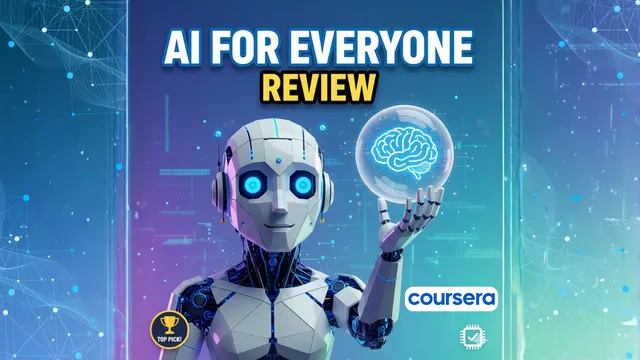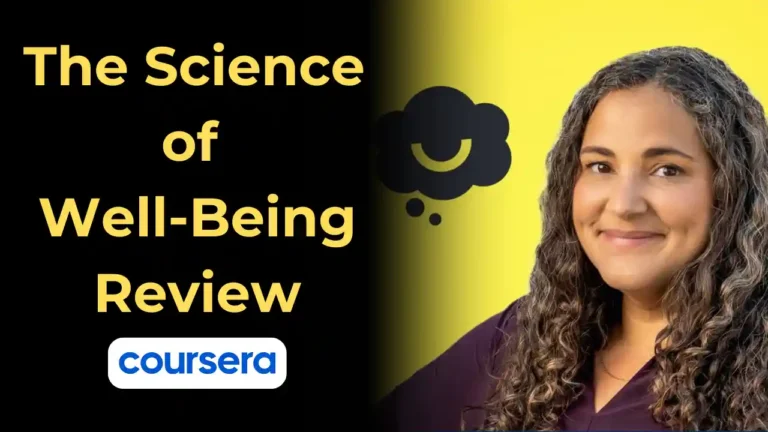Coursera Plus - Get Unlimited Access to 7,000+ Online Courses
Coursera Plus - Get Unlimited Access to 7,000+ Online Courses
Coursera Plus - Get Unlimited Access to 7,000+ Online Courses
7 Best Coursera Courses to Learn Data Analytics
Disclaimer: This post is NOT sponsored. Some product links are affiliate links which means if you buy through those links, you won’t pay anything extra and we’ll also receive a small commission on a purchase.

For a successful career as a Data Analyst, you need to acquire a specific set of skills. Most importantly, you need a deep understanding of data visualization. Fortunately, a myriad of online courses exist to make the learning journey fun. But traversing through this maze of courses to find the one that suits you best can be exhausting.
That’s where we swoop in to lend you a hand and gently nudge you in the right direction. We have handpicked the best Coursera courses to learn data analytics. I am sure you will find a course that meets your requirements regardless of your skill level. So, let’s take a look at them.
Best Coursera Data Analytics Courses in 2026
All our chosen courses help you acquire essential skills, such as data mining, efficient use of visualization software, and data management. Let’s see how much more in-depth content is taught in each course.
This Google data analytics course is an 8-course series for beginner-level (no prior experience required) enthusiasts to learn in-demand skills. You will have a deeper understanding of data cleaning, data-driven decision-making, and the importance of spreadsheets and query languages in data analytics upon completion of this program.
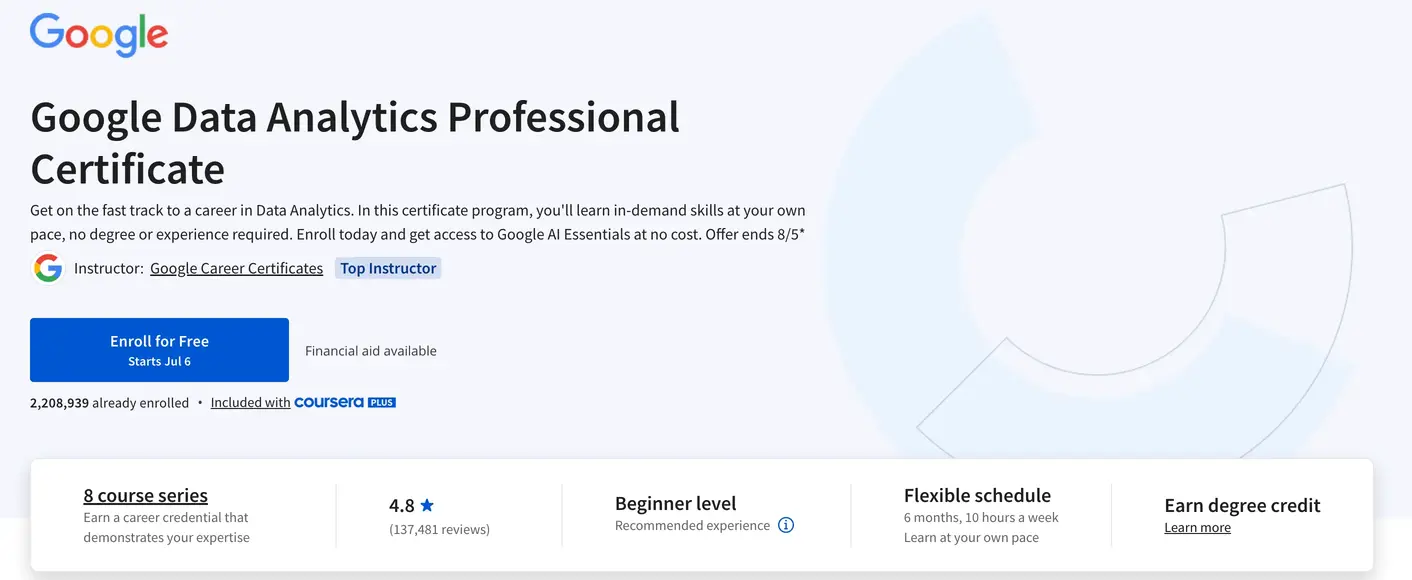
You will be pleased to know that the courses also break down the functions and components of databases and teach the best practices for organizing data. The courses cover data integrity and how it could be compromised, SQL databases, and how to verify data cleansing results.
Data aggregation and functions for data computations using spreadsheets are also part of the curriculum. This program is an excellent choice if you are interested in knowing how Tableau and data storytelling work. Course 7 in this program is dedicated to teaching you data analysis through R programming.
Finally, the capstone project requires you to complete a case study. Moreover, Google experts teach you AI skills. You can access Google AI Essentials at no cost, too, for a limited time. Awesome, right?
Meta’s 5-course series teaches more than the usual data collection, sorting, evaluating, and visualization. You will become familiar with statistical analysis including regression analysis and hypothesis testing (the bane of my existence when I had to power through statistics during college).
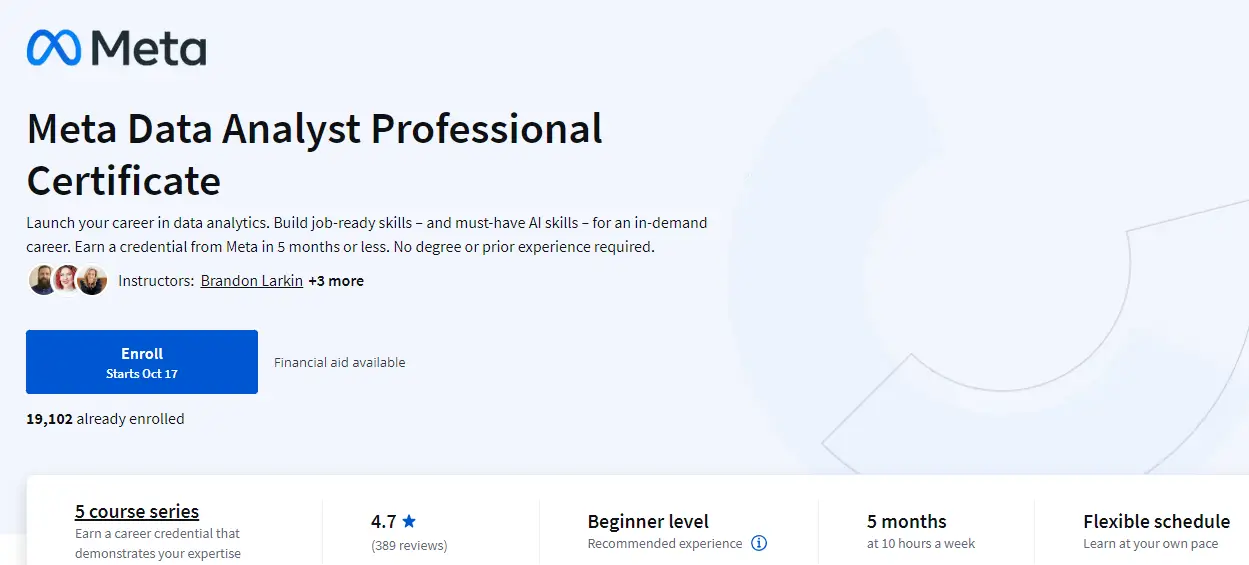
It makes understanding and application of the OSEMN framework (a data project life cycle) fun. You will also find it easy to handle Python programming for data analysis and feel at home using the Pandas library. Moreover, this program has a wealth of knowledge on data privacy, big data management, and machine learning basics.
In short, you will embark on the journey to build and strengthen your technical skills with talented and experienced instructors to guide you in this Meta data analytics course. You can also opt to learn generative AI tools and techniques used in data analytics.
What’s special about this 11-course program? Well, besides the usual, it explains concepts such as data wrangling, predictive modeling, etc., and their practical applications. You also learn to construct advanced charts, treemaps, sparklines, and the like. NumPy library and Jupyter Notebooks will become familiar territory like the back of your hand.
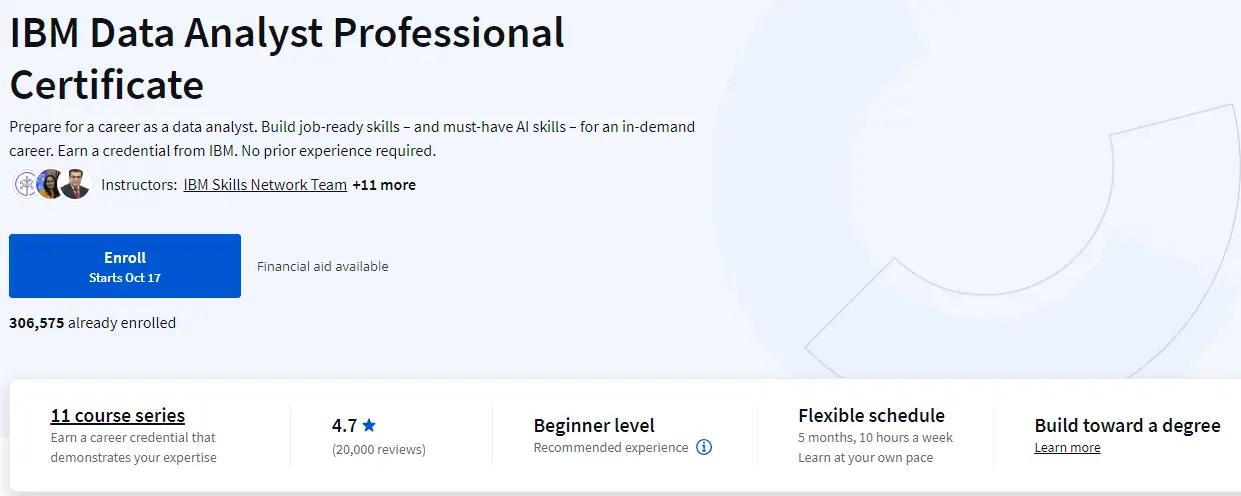
However, this program’s heavy reliance on Python programming can be unappealing to some. You will also learn more about Generative AI tools and how to apply them to real-world case studies. Data ethics is something not all program series teach. But, this one helps you consider the ethical dilemmas faced when using Gen AI in data analytics.
The final course in this program is a career guide and offers some effective techniques for providing brilliant answers to interview questions. You will also be capable of making a professional presentation by the time you complete the courses.
This program is a 9-course series that focuses on data analytics using Excel and R. You will know how to import and clean data in Excel, what lookup functions are, and the importance of Pivot tables in these courses. You will also learn to design interactive dashboards.
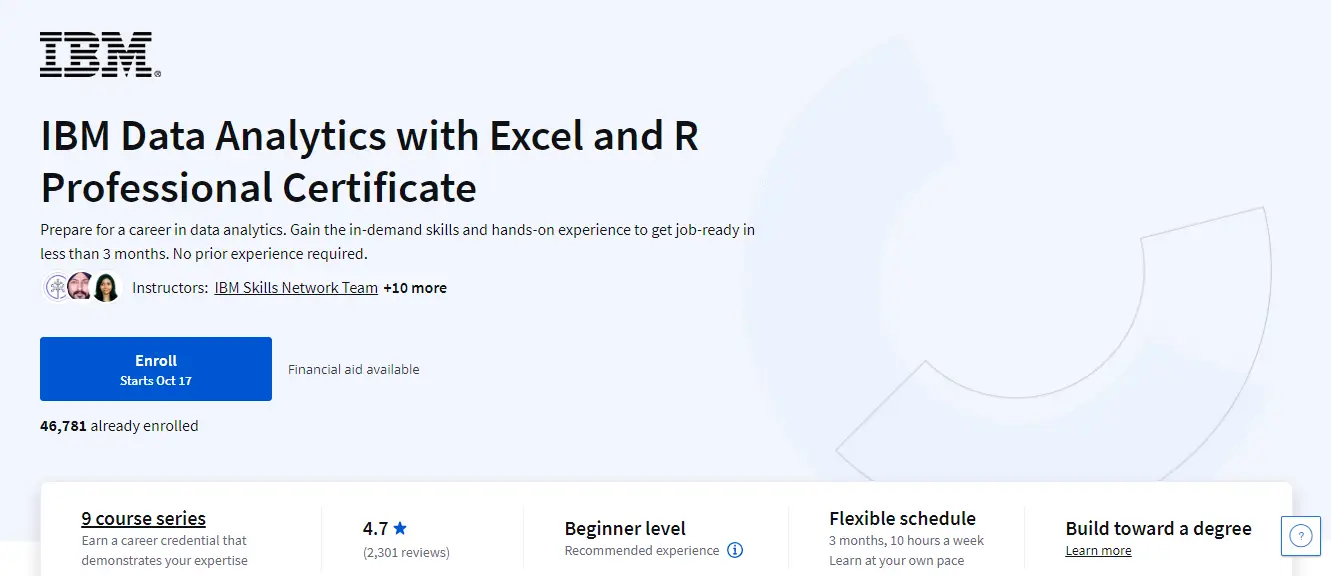
Later, you will understand how to deal with data files and scrape web pages (making bots extract data from websites) using R. However, the main attractive feature of this program is the evaluation of overfitting and underfitting in models (computer programs). Overfitting means the model performs well with training data but has trouble with new data.
Underfitting means the model performs miserably with training and new data. Knowing how to deal with these common issues goes a long way in helping you succeed. Finally, in this IBM data analytics course, you will work on the capstone project to demonstrate your practical knowledge.
So far, we have seen course programs suitable for those without prior experience. However, this advanced data analytics Coursera course requires a good understanding of foundational analytical skills, principles, and tools. You will learn to build regression and machine learning models for data analysis and interpretation in this program. How cool is that?
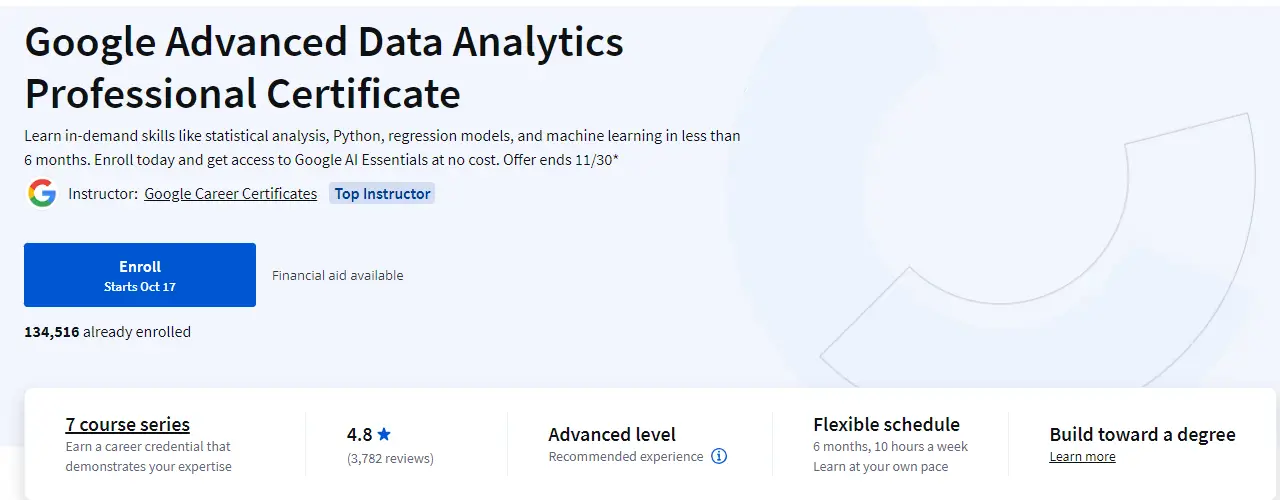
You will also apply statistical methods to facilitate data investigation and understand how to communicate insights to the stakeholders. More importantly, you learn how data professionals maintain data privacy (a sensitive issue that every data analyst must be aware of). After that, the instructors teach Python Basics and move on to more interesting topics.
Exploratory Data Analysis (summarizing the main characteristics of data sets) is one of those interesting topics. Moving on, you will understand ‘the nuts and bolts’ of Machine Learning as the course details fondly mention.
The thing I love the most about this course program is the capstone project. It’s so interesting that I am itching to start working on it. (Never mind the fact that my skill level is nowhere near the required level.)
This Microsoft data analyst course ensures you amass all essential knowledge of Power BI for data analysis. You will learn how to use the key Power BI components and understand the various data analysis stages in this 9-course series. It also teaches you how to clean and transform data for modeling.
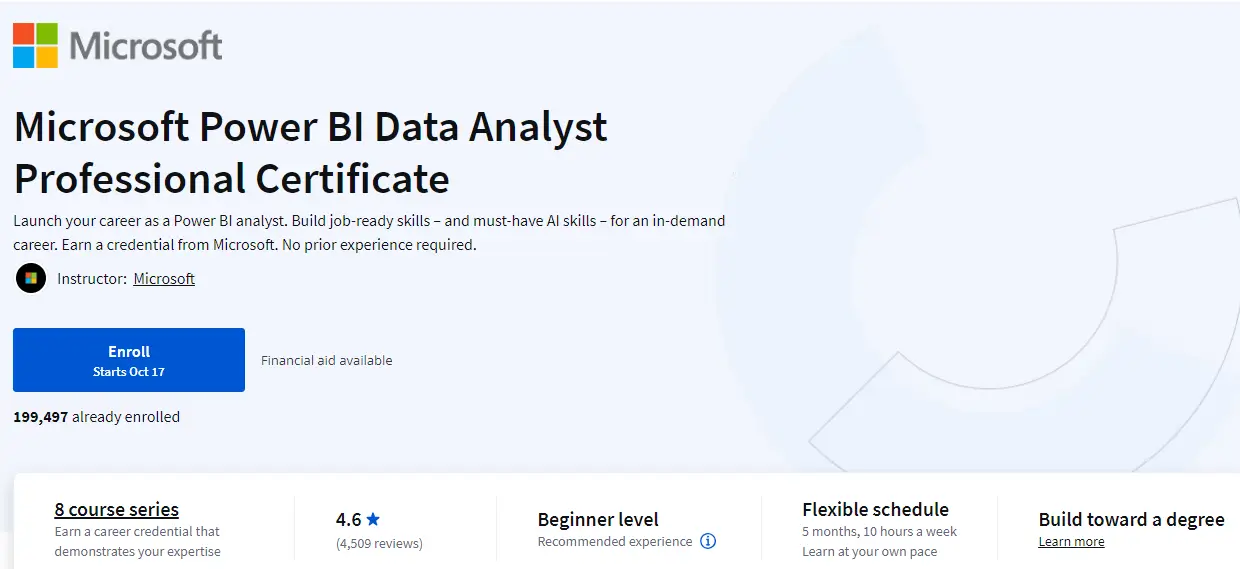
The fascinating part of this course is learning to use profiling tools to facilitate data anomaly detection. You also find out how to optimize the performance of Power BI models and design accessible reports and dashboards. Specifically, you learn to add videos, QR codes, and streaming data to dashboards.
Finally, the instructors teach you how to create and publish an app and implement security measures in reports in Power BI. The icing on the cake is the final course in the series. It prepares you for the Microsoft PL-300 exam. You also have the option to study Generative AI for Power BI.
Business Analytics Specializationby University of Pennsylvania
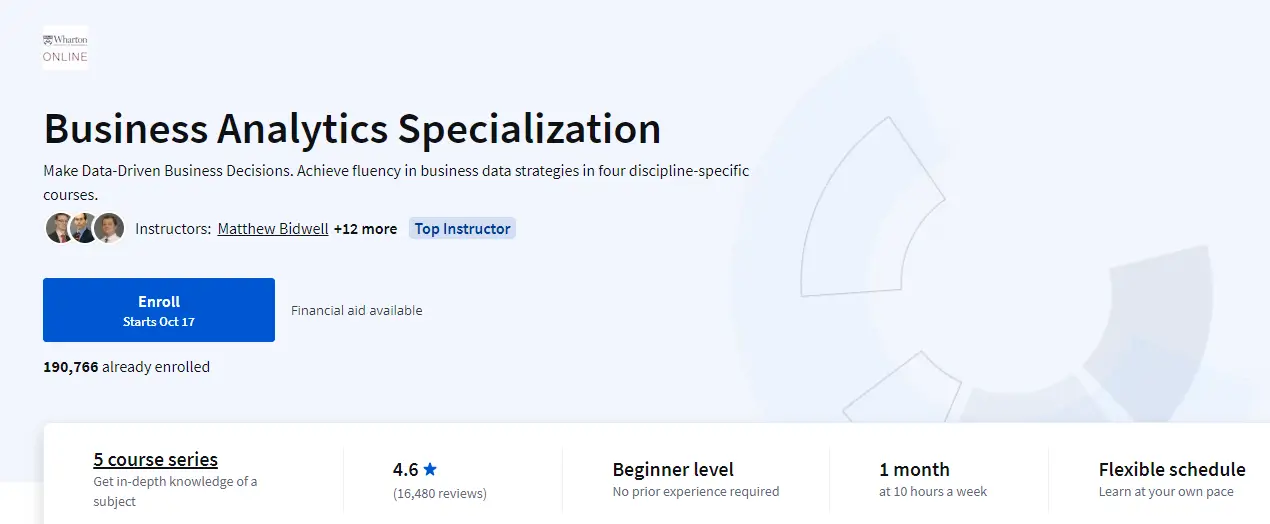
As the name suggests, Wharton’s 5-course series focuses on data analysis for business decision-making. In the first course, you will learn to predict customer behavior based on their browsing and buying patterns. The second course deals with data collection technologies and transforming the data to build supply-demand models.
That is, you learn to match supply and demand optimally for profit maximization (a truly intriguing concept). The third course in the series is one of the few available HR data analytics courses with interesting content. Apparently, it’s possible to make decisions about the people who work under you based on deep data analysis (did you know that?)
You can recruit, retain, evaluate performance, promote, and compensate people based on data analysis rather than following the age-old tradition of making decisions based on personal relationships. The fourth course explains how financial and non-financial data combine to help predict events and financial performance.
The expert instructors explain how accounting data sheds light on aspects of risk management, customer behavior prediction, and corporate strategy. The final course is the project where you must utilize everything you have learned so far and address business challenges. I must say, this is my favorite course series among our seven chosen ones.
Criteria for Selection
All the course programs/series we chose have fantastic content as expected. After all, reputed institutions offer these courses to help the current generation build in-demand data analytical skills. Each course has an excellent project that helps beef up your portfolio and impress potential employers.
The instructors are awe-inspiring, too. If experts from Google, Microsoft, and IBM and professors from the University of Pennsylvania are not impressive enough for you, I don’t think anyone will impress you. Moreover, all the courses are up-to-date and therefore, incredibly well suited for imparting knowledge about current industry practices.
Learners have rated the courses highly praising their balanced focus on theory and practice. Best of all, you get accredited certifications that hold significant value in the industry. You also get exclusive access to career resources like resume review, interview prep, and career support through Coursera’s job search guide on completing (either of the first six) courses.
Another upside to opting for these courses (except the Business Analytics course) is that they make you eligible for course credit that counts if you enroll in specific online degree programs. You can check the list by clicking ‘learn more’ in the Build Toward Degree section.
All these benefits were factored in when we searched for the best Coursera courses to learn data analytics.
Enrollment Options in Coursera Data Analytics Courses
Coursera PlusBest Option
With Coursera Plus, you can get access to all the above mentioned Coursera data analytics courses. You don’t have to buy courses individually.
Best part is you’ll also get access to more than 7,000 Coursera courses with the Coursera Plus subscription. You can also get unlimited certificates.
Buy a Single CourseOne at a time
If you just want to try one data analytics course on Coursera, then you can simply purchase that single course. You’ll get complete access to the course you buy.
But I would recommend you Coursera Plus instead of taking this option. And that is for a simple reason, Value for money. If you compare the cost of one course to Coursera Plus, you’ll definitely see the difference.
Audit the CourseLearn for FREE
If you don’t want the certificates but if you just want to learn, you can choose the audit option. With this option, you can enroll in a course for free and get access to most of the course content like videos, articles, etc. to learn data analytics from it.
You’ll see this audit option only in individual course page. It won’t be available directly in specialisation or professional certificate page.
Please note that for some courses you won’t see an audit option.
Final Thoughts
Data is everpresent and ubiquitous. It pervades our mundane lives irrespective of our wishes. Therefore, mastering data analytics skills is always a good idea regardless of whether you want to make a career out of it or not.
Our chosen Coursera courses on data analytics help achieve just that. So, start your journey, master the essential skills, and take the world by storm. Good luck! I am ending this article with the phrase that accompanies the traditional Vulcan salute – Live long and prosper.
FAQs
1. How much do Coursera data analytics courses cost?
Coursera data analytics courses cost around $39 – $59/month. The cost varies depending on the course and the duration you require to complete it. You can check what each course costs when you choose the enroll option.
2. Are Coursera Data Analytics courses worth it?
They are definitely worth it. Not only do you get accredited certificates, but you also learn how to apply the skills you learned in real-world scenarios.
3. How long does it take to complete a data analytics course on Coursera?
It takes 3 – 6 months to complete a data analytics course on Coursera. The exact time taken depends on how many hours a week you spend studying.

